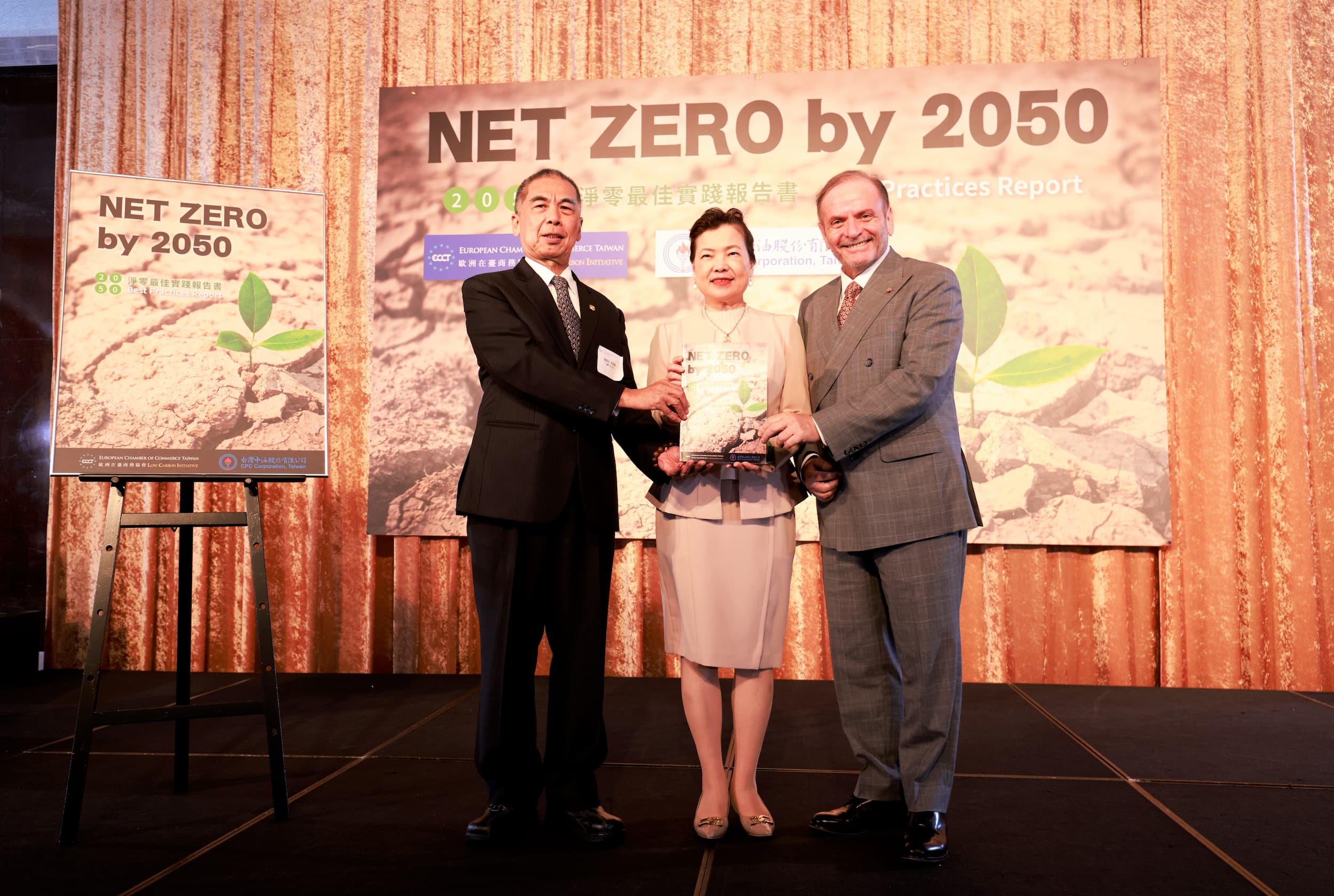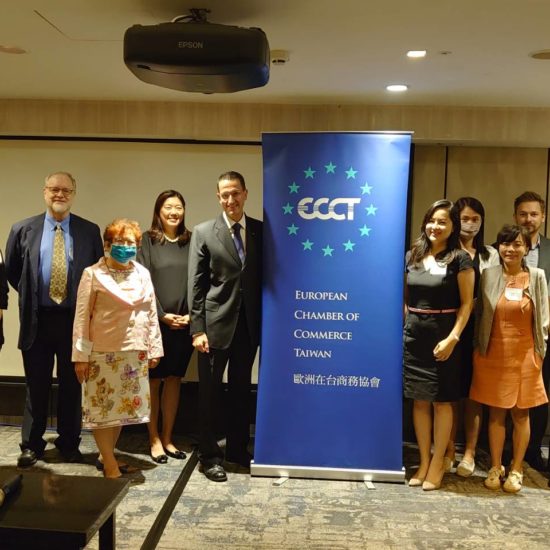ECCT and CPC release net zero report

The ECCT and CPC Corporation released the "Net Zero by 2050 Best Practices Report" (歐洲商會-台灣中油 2050淨零報告書) at a Premium Event lunch. Edited by the KPMG Taiwan, the report showcases some of the best practices and examples in Taiwan and globally provided by ECCT members and CPC aimed at helping Taiwan to reach net zero emissions by 2050. The launch was attended by Wang Mei-hua, Minister of the Ministry of Economic Affairs, who gave a keynote speech on Taiwan's net zero policy and received a copy of the report from ECCT Vice Chairman Giuseppe Izzo and Lee Shun-chin, Chairman of CPC. As the report was released to coincide with the first day of EU's Climate Action Week, Filip Grzegorzewski, Head of the European Economic and Trade Office, was invited to talk about the EU's climate policy while Niven Huang, Managing Director of KPMG Sustainability Consulting gave a presentation summarising the highlights of the report.
Ahead of the lunch, Minister Wang met with representatives from CPC and ECCT member companies that contributed chapters to the report. During the meeting, representatives highlighted the main topics covered in their chapters.
In her speech at the launch, Minister Wang said that implementing the energy transition by aggressively increasing the capacity of renewable energy to cut carbon emissions is the first step on the path toward achieving Taiwan's net-zero emissions goal by 2050. In this regard, she said that Taiwan is aiming to speed up the installations of both solar and offshore wind energy capacity this year. Wang said that 2.5GW of solar photovoltaic panels are expected to be installed in 2022 (a new annual high and up from 1.88GW in 2021) as well as reach a total of 200 offshore wind turbines (100 had reportedly been installed as of the end of August).
In his speech, CPC chairman Lee said that CPC has reduced its carbon emissions by more than 30% from 2005 levels and continues to work towards achieving its medium-term goal of cutting emissions by 49.5% by 2030 and its long-term goal of achieving net zero emissions by 2050.
The report is the second such collaboration between the ECCT and CPC Corporation following the 2018 publication of the "Energy Transition for the Next Generation". This year's report calls on the Taiwan government and companies to draw up policies and establish funding programmes to support national and private corporate pathways to net-zero emissions by investing in breakthrough technologies such as hydrogen energy, Carbon Capture Utilisation and Storage (CCUS), electric and hydrogen vehicles, and floating offshore wind energy, while at the same time enhancing energy efficiency in order to decarbonise power generation and reduce CO2 emissions. The report highlights efforts by companies in the financial and oil and gas sectors to advance the transition to net zero by investing in new market opportunities, especially hydrogen energy, battery storage, smart grids and energy saving, which have been attracting billions of dollars in venture capital.
Among others, the report highlights the following best practices and solutions: Air Liquide and TotalEnergies have partnered to decarbonise hydrogen production and implement large-scale CO2 capture and storage solutions (CCS). Bosch offers the technology needed to produce hydrogen, fuel cells for mobile and stationary applications and hydrogen filling stations while K&L Gates shares the hydrogen policy and development strategy of Australia.
Ørsted provides a feasible strategy for developing renewable hydrogen and RWE Taiwan highlights the potential of floating offshore wind energy. Merck describes developing materials that help to save energy and replace harmful materials with environmentally friendly alternatives. Michelin is producing tyres that reduce rolling resistance and therefore fuel consumption.
Taiwan Power Company outlines how it is building resilient infrastructure for the green energy transition. TCI has pledged to achieve zero-carbon factories and zero-carbon products while Atlas Copco is committing to science-based targets for the reduction of greenhouse gas emissions in its entire value chain. Tonglit Logistics is part of an ambitious project to create a smart green carbon neutral logistics park.
Standard Chartered is providing finance while the Renewables Consulting Group and TÜV Rheinland provide, respectively, valuable consulting and verification services to help their clients to transition to net zero.
In addition, the German Institute Taipei and French Office in Taipei also contributed chapters to the report outlining national policies and strategies to reach net zero targets.
For the report, please refer to this link: https://reurl.cc/GEaYoG

